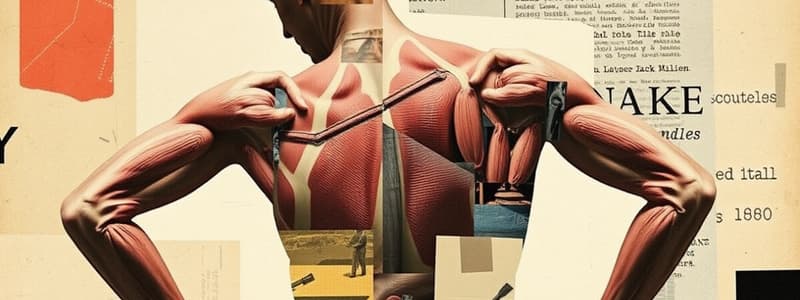Podcast
Questions and Answers
What is the primary function of the Teres Major muscle?
What is the primary function of the Teres Major muscle?
- Extension, Adduction & Internal rotation of the shoulder (correct)
- Flexion & Abduction of the shoulder
- Lateral rotation & Extension of the shoulder
- Flexion, Adduction & Internal rotation of the shoulder
Which muscle is commonly regarded as the 'little brother' of the Latissimus Dorsi?
Which muscle is commonly regarded as the 'little brother' of the Latissimus Dorsi?
- Supraspinatus
- Infraspinatus
- Teres Major (correct)
- Teres Minor
What is the attachment site of the Teres Major muscle?
What is the attachment site of the Teres Major muscle?
- Lateral border of the scapula and the greater tubercle of the humerus
- Posterior scapula and the greater tubercle of the humerus (correct)
- Anterior scapula and the lesser tubercle of the humerus
- Superior border of the scapula and the acromion process
What movement does the Quadratus Lamborum primarily facilitate?
What movement does the Quadratus Lamborum primarily facilitate?
Which statement correctly describes the Quadratus Lamborum?
Which statement correctly describes the Quadratus Lamborum?
The primary role of the Supraspinatus in shoulder stabilization is to:
The primary role of the Supraspinatus in shoulder stabilization is to:
Which is NOT a function of the Serratus Anterior muscle?
Which is NOT a function of the Serratus Anterior muscle?
Which muscle group is primarily responsible for shoulder stabilization during overhead movements?
Which muscle group is primarily responsible for shoulder stabilization during overhead movements?
Which muscle belongs to the superficial layer of the extrinsic back muscles alongside the Levator scapulae, Trapezius, and Rhomboids?
Which muscle belongs to the superficial layer of the extrinsic back muscles alongside the Levator scapulae, Trapezius, and Rhomboids?
What is the primary action of the Serratus Anterior muscle?
What is the primary action of the Serratus Anterior muscle?
Which part of the Deltoid muscle is primarily responsible for shoulder flexion?
Which part of the Deltoid muscle is primarily responsible for shoulder flexion?
What is the significance of the anatomy of the Deltoid muscle?
What is the significance of the anatomy of the Deltoid muscle?
Which of the following muscles is NOT considered part of the rotator cuff?
Which of the following muscles is NOT considered part of the rotator cuff?
Which action is NOT performed by the Deltoid muscle?
Which action is NOT performed by the Deltoid muscle?
The Serratus Anterior muscle is often referred to as the ‘superhero’ muscle because of its location and function. What does it connect?
The Serratus Anterior muscle is often referred to as the ‘superhero’ muscle because of its location and function. What does it connect?
What is the function of the Supraspinatus within the shoulder complex?
What is the function of the Supraspinatus within the shoulder complex?
What is the primary function of the Supraspinatus muscle?
What is the primary function of the Supraspinatus muscle?
Which muscle assists in abducting the arm beyond 15 degrees?
Which muscle assists in abducting the arm beyond 15 degrees?
What is the role of the Serratus Anterior muscle in shoulder mechanics?
What is the role of the Serratus Anterior muscle in shoulder mechanics?
The Infraspinatus muscle is primarily responsible for which action?
The Infraspinatus muscle is primarily responsible for which action?
Which of the following muscles is NOT part of the rotator cuff?
Which of the following muscles is NOT part of the rotator cuff?
What action is antagonistic to the Serratus Anterior?
What action is antagonistic to the Serratus Anterior?
How many degrees does the Supraspinatus abduct the arm?
How many degrees does the Supraspinatus abduct the arm?
What is the primary function of the rotator cuff muscles?
What is the primary function of the rotator cuff muscles?
Study Notes
Extrinsic Back Muscles
- Superficial layer includes Levator scapulae, Trapezius, Rhomboids, and Latissimus dorsi.
- Latissimus dorsi aids in extension, adduction, and internal rotation of the shoulder.
Deltoid Muscle
- Triangular-shaped muscle surrounding the shoulder joint, contributing to its rounded shape.
- Divided into three groups: Anterior, Middle, and Posterior, all easily palpable.
- Function includes abduction, flexion/extension, and rotation of the shoulder.
Serratus Anterior
- Known as the "superhero" muscle, it is located along the posterior lateral ribcage.
- Provides protraction of the scapula, aiding in shoulder movements.
- Origins from the ribs and attaches to the medial border of the scapula.
Teres Major
- Located along the lateral border of the scapula and considered a synergist to the Latissimus dorsi.
- Functions in shoulder extension, adduction, and internal rotation.
- Attaches to the posterior scapula and the humerus near the armpit.
Quadratus Lumborum
- A thick, flattened muscle with a quadrangular shape in the lower back region.
- Responsible for lateral flexion and extension of the spine and tilting of the pelvis.
- Assists in scapular abduction, opposing the action of the Rhomboids.
Rotator Cuff Muscles (SITS)
- Comprises four muscles crucial for shoulder stability:
- Supraspinatus
- Infraspinatus
- Teres Minor
- Subscapularis
Supraspinatus
- The smallest and most superior muscle of the rotator cuff.
- Key role in abduction and stabilization of the shoulder joint.
- Initiates arm abduction from 0-15 degrees and assists deltoid from 15-90 degrees.
Infraspinatus
- Functions in external rotation, abduction, horizontal extension, and stabilization of the shoulder.
Studying That Suits You
Use AI to generate personalized quizzes and flashcards to suit your learning preferences.
Related Documents
Description
This quiz explores the superficial layer of extrinsic back muscles, including the Latissimus dorsi, Trapezius, Levator scapulae, and Rhomboids. Additionally, it covers key shoulder movements such as abduction, flexion, and rotation. Test your knowledge on these essential muscle groups and their functions.



